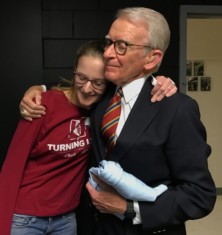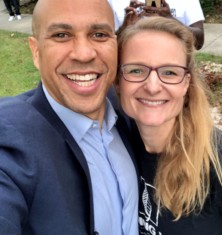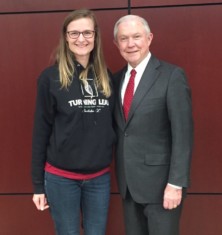I have a unique perspective. I’m not an academic, but I’m more than a practitioner.
I founded and currently run a reentry nonprofit in Charleston, SC called Turn90. The program is four months of cognitive behavioral classes, transitional employment to help men think and act differently so they stay out of prison.
In our early days we had tons of problems. I knew the research, but not the application. And the application is the hard part. Poor implementation has taken many a well-designed program down. It almost took us down. But it didn’t, and now I have experience in designing and implementing an evidence-informed reentry program. I understand how various program components – recruitment, assessment, phases, etc. – play out in the real world, and how to engage, retain and change the behavior of a difficult target population.
I have experience facilitating cognitive behavioral groups for people in and out of prison. I taught classes in jails for years, and I’m trained in Thinking for a Change, Moral Reconation Therapy, as well as a variety of curricula designed by the University of Cincinnati. In 2018, I wrote a comprehensive scripted cognitive behavioral curriculum for people returning home from prison, consisting of 60 lessons and an accompanying cognitive behavioral “toolkit,” totaling 150 intervention hours. Classroom behavioral management systems, facilitation skills and curriculum is a sweet spot for me.
I’ve had a chance to work with some great folks along the way. I consult with the the READI Chicago program and I provided a comprehensive review for Domus in the design of their new pre-release reentry program, Invictus.
I’ve been invited to meet people I never dreamed of. Former U.S. Deputy Attorney General, Sally Yates, visited Turning Leaf and hailed it as a program that could “change the whole criminal justice system.” I was a guest at an intimate dinner with Facebook CEO Mark Zuckerberg. U.S. Senator Tim Scott (R-S.C.) invited me to meet with former Attorney General Jeff Sessions to talk about criminal justice reform efforts. Former U.S. Deputy Secretary of Labor, Chri Lu, visited us a few years back. And U.S. Senator Cory Booker (D-N.J.) dropped by Turning Leaf recently to learn about our operations.
I’ve had some shout-outs in the media over the years.
- Charleston Magazine, 2019. Starting anew
- The Post & Courier, 2019. Turning Leaf is raising the stakes, and its profile, in recidivism
- The Marshall Project, 2018. Training the brain to stay out of jail
- The Post & Courier, 2018. Unless those at the top act, South Carolina prisons will perpetrate the crime problem
- Charleston Business Journal, 2018. A different path to a second chance.
- ABC 4 News, 2018. Lowcountry nonprofit helps ex-convicts enter society, workforce
- The Post & Courier, 2017. Amy Barch is on a mission to stop crime, one criminal at a time
- The Sisters of Charity Foundation. Turning Leaf aims to break cycle
- Charleston City Paper, 2017. Turning Leaf teaches former prisoners to learn from past mistakes.
- The Post & Courier, 2017. Saying goodbye to the streets and prison
- MSNBC, 2015. Lockup Charleston extended stay
- The Washington Post, 2015. U.S. official says U.S. prison system’s best reentry program cut dramatically
- The Huffington Post, 2015. This crazy plan shook up an old school prosecutor’s outlook
- The Post & Courier, 2015. A rehabilitation program that could become a national model
- The Post & Courier, 2015. Turning Leaf getting national attention for good reason.
- Live 5 News, 2014. Charleston offenders offered another chance at freedom with new prison alternative program
People also say some nice things about me.
It is this unique combination of whip-smart research-based insights paired with the hard work of program delivery and fueled by unrelenting focus and enthusiasm that makes Amy a rare bird in the field and an invaluable asset to whomever is lucky enough to work with her.
I first met Amy and her team as part of a series of visits to programs around the country that were doing innovative work around pairing cognitive behavioral therapy with employment opportunities. We have been lucky enough to have her contribute this expertise to the implementation of READI Chicago serving men at the highest risk for gun violence involvement in Chicago, where her critical insights on program design and delivery helped course correct at a critical juncture in the program’s development. From the minute we stepped onto Turning Leaf’s campus in Charleston, South Carolina, I have been continually impressed by Amy’s ability to combine evidence-based practices with thoughtful practitioner knowledge and incorporate it into program design. If she were to stop there, it would already be a huge contribution to the field, but what is unique about Amy is that these ideas then endure a rigorous field-based trial as she and her team experiment with what works (and what does not). They are continually tweaking and improving their own facilitation skills and program model to best serve participants. It is this unique combination of whip-smart research-based insights paired with the hard work of program delivery and fueled by unrelenting focus and enthusiasm that makes Amy a rare bird in the field and an invaluable asset to whomever is lucky enough to work with her.
She is building a body of work that is based on the research she has accessed and her program’s performance, which she is disseminating so as to help elevate the quality of reentry services in this country.
I had the opportunity to work with Amy to develop a theory of change model for Turning Leaf in 2016. I was impressed when I met her, and I’ve continued to be impressed by her in the years since. Turning Leaf was facing some serious problems in its early years, but Amy and her team were able to implement the plan we created together and turn things around. Amy truly cares about working effectively to help prisoners reenter and succeed in the community. In order to do so she uses relevant research to look for opportunities to improve her program, and performance data to manage her program to help returning prisoners achieve essential outcomes. She is building a body of work that is based on the research she has accessed and her program’s performance, which she is disseminating so as to help elevate the quality of reentry services in this country.
It’s rare to meet someone who is not only passionate about working on the front lines of prisoner reentry, but is also dedicated to knowing and understanding all the research and data.
While I was Mayor of Charleston, I had the privilege to know Amy and support her project, Turning Leaf. Since our first meeting, I knew that she would do great things in an area where we desperately need leadership, innovation and reform. It’s rare to meet someone who is not only passionate about working on the front lines of prisoner reentry, but is also dedicated to knowing and understanding all the research and data. Amy is a gift to Charleston and to the world.
Amy is a true visionary who can revolutionize our entire reentry system.
Amy and Turning Leaf have been a breath of fresh air for me and for Charleston. I’ve seen first-hand the impact that Turning Leaf has had on defendants in my courtroom. I believe we should have Turning Leaf in every courthouse in South Carolina. But Turning Leaf is only the beginning. Amy is a true visionary who can revolutionize our entire reentry system.



